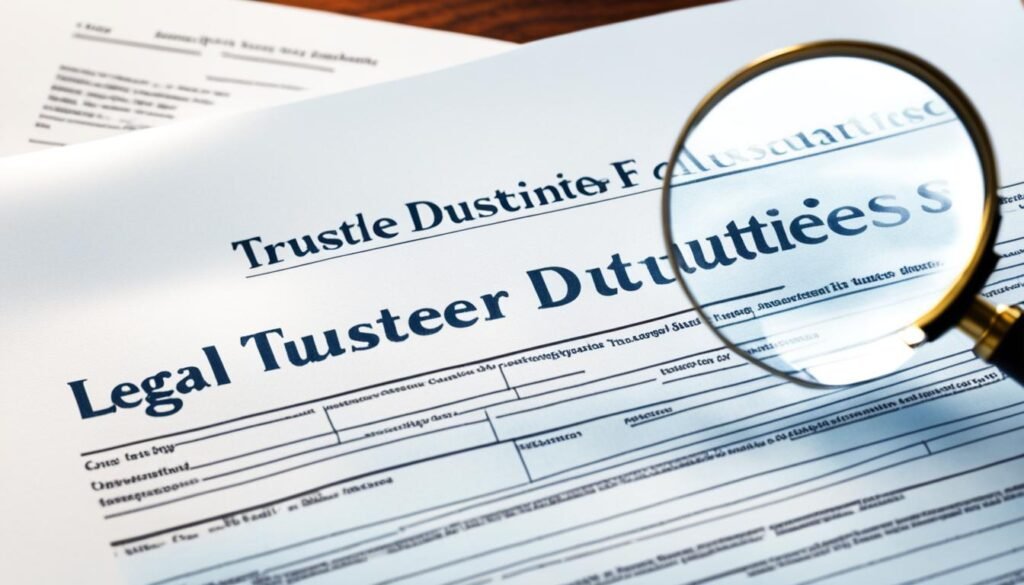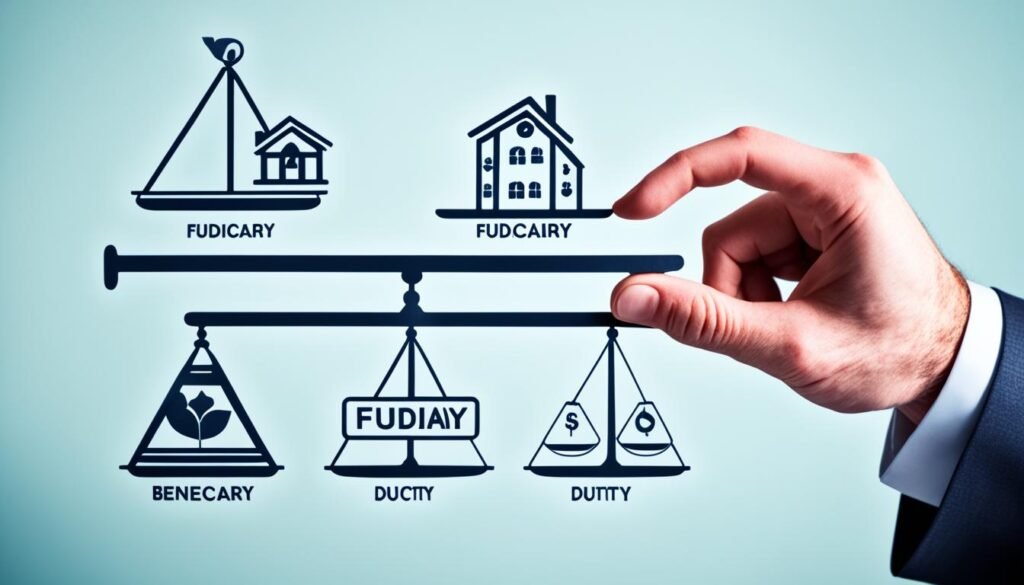Being a trustee in California means you have a big job and legal duties1. You must keep track of the trust’s assets, income, and spending every year or when the trust changes, ends, or by court order1. It’s crucial to report these details to the trust’s beneficiaries accurately1. You’re expected to act only for the good of the beneficiaries, not for your own gain1.
Key Takeaways
- Trustees in California have significant legal responsibilities and are held to a high standard of care.
- Trustees must administer the trust according to its terms, account to beneficiaries, and furnish information.
- Fiduciary duties include maintaining loyalty, impartiality, and avoiding conflicts of interest.
- Prudent management of trust assets and proper distribution are critical responsibilities.
- Failure to fulfill duties can result in legal liabilities for the trustee.
What is a Trustee and Their Role in California?
In California, a trustee is key to managing property for the trust’s beneficiaries2. They follow the trust’s rules and state laws, as seen in sections 16000-16015 of the Probate Code2. If a trustee handles more than one trust, they can make fair transactions between them, keeping both sets of beneficiaries informed2.
Types of Trusts in California
California has different trusts like revocable living trusts, irrevocable trusts, and testamentary trusts. The type of trust and its rules will tell the trustee what they need to do.
The Roles and Duties of a Trustee in California
Being a trustee in California means you have big responsibilities. You manage assets, keep records, talk to beneficiaries, do accounting and reporting, follow laws and taxes, and give out assets2. You must stay neutral and avoid personal interests to do your job well for the trust and its people2.

Trustees in California must keep trust property safe, make it work well, and keep it separate from their own stuff2. They need to protect trust claims, defend the trust, and not give away important tasks without checking in2. If there are several trustees, they all need to help with the trust and stop any trust breaches2. Trustees should use their skills and keep promises of special skills if the settlor counted on them2.
Duties of a trustee California
As a trustee in California, you have a big job to do. You must make sure the trust is handled as the trust says3. This means reading the trust document well and knowing any changes to it4. You also need to keep track of the trust’s money and actions for the people who will get the money4.
Obligation to Administer the Trust, According to Its Terms
When you become a trustee, you need to put the trust’s property in your name3. You’ll need to show an Affidavit of Successor Trustee and proof that the trust creator can’t make decisions anymore3. You also have to follow any instructions from the person who can change the trust or the one the trust creator picked to guide you2.
Duty to Account to the Beneficiaries
You must give the trust’s beneficiaries updates on the trust’s money, earnings, and spending4. This might mean doing yearly reports or when there’s a big change, when the trust ends, or if a court says so3. If you don’t give the updates, the people who are supposed to get the money can sue you for three years after they find out4.
Duty to Furnish Information to Beneficiaries
You also have to give the trust’s beneficiaries the information they need4. This includes details about the trust’s money, investments, and any changes or money given out4. If you don’t give them the information, they can take legal action against you4.

Many families in California use ClearEstate to make managing the trust easier. ClearEstate has helped over 10,000 families with probate and trust management3.
| Trustee Duty | Legal Requirement |
|---|---|
| Administer Trust According to Terms | Probate Code Section 16000 |
| Follow Directions from Authorized Persons | Probate Code Section 16001 |
| Act Solely in Interest of Beneficiaries | Probate Code Section 16002 |
| Deal Impartially with Multiple Beneficiaries | Probate Code Section 16003 |
| Refrain from Personal Profit or Adverse Transactions | Probate Code Section 16004 |
By knowing and doing these important tasks, you make sure the trust is handled right. This protects the people who will get the money2.
Fiduciary Duties of a Trustee
As a trustee in California, you have important duties to follow. These duties help you manage the trust right and keep the trust’s assets safe5.
Duty of Loyalty
You must act only for the benefit of the trust’s beneficiaries, not for your own gain5. This means you can’t use the trust for your own benefit4. You need to make choices that help the beneficiaries more than yourself4.
Duty of Impartiality
You must treat all beneficiaries fairly and not show favoritism4. This is key when there are many beneficiaries with different needs. You need to make sure everyone gets what they deserve to meet this duty.
Duty to Avoid Conflicts of Interest
You also need to stay away from conflicts of interest that could affect how you manage the trust5. This includes personal or work issues that could lead to self-dealing4. It’s important to spot and fix any potential conflicts to keep up with your duties.
Keeping these duties in mind is crucial for trustees in California. It helps keep the trust honest and protects the beneficiaries’ interests5. Not following these duties can lead to legal trouble and fines for the trustee4.
“Trustees in California must administer trusts with reasonable care and skill to advance the interests of beneficiaries.”5
Managing Trust Assets and Distributions
As a trustee in California, you have a big job. You must manage the trust’s assets well and make sure they go to the right people. This means making smart investment choices, keeping accurate records, and following the trust’s rules.
Duty to Invest & Make Trust Property Productive
Trustees must invest trust assets wisely to get good returns and keep the trust’s value6. The California Probate Code 16040 says trustees must do their job with care and knowledge6. They need to watch the market, spread out investments, and make smart choices to make the most of the trust.
Asset Management
Keeping accurate records is key to managing assets well6. Within 60 days after the trustor dies, trustees must tell all the people who should get something, giving them 120 days to question the trust6. They also need to keep financial statements, receipts, and logs of talks to be open and responsible.
Distribution of Assets
When it’s time to give out the assets, trustees must follow the trust’s rules and be fair7. Usually, a trust in California can end in 12 to 18 months if it’s simple7. But things like fights over the trust, claims from creditors, and tax issues can make it take longer.
Trustees need to be careful and honest to do their job right for the trust’s people7. In easy cases, giving out the assets in California can take about 4 to 5 months7. But if things are complicated, it might take longer, so planning and talking to everyone involved is important.
“The trustee’s main goal is to handle the trust’s assets wisely and give them out as the trust says, making sure the people who are supposed to get something do.”
Legal Liabilities and Limitations
As a trustee in California, you must meet a high standard of care when handling a trust. If you don’t do your job well, you could face personal legal trouble, including losing money from the trust8. You are legally expected to look out for the trust’s and the beneficiaries’ best interests8. If you don’t do this, you could be breaking the law8.
You must use reasonable care, skill, and caution when managing the trust’s assets. This includes making smart investment choices and figuring out the value of trust assets8. Gokal Law Group often helps beneficiaries when trustees don’t follow California’s trust rules8. If a trustee doesn’t do their job right, they could be personally liable for damages or even lose their job8.
But, there are times when you might not be fully responsible if the trust agreement says you’re not8. It’s important to act fast if someone breaks their fiduciary duty to protect the trust and its assets8. Getting help from a top California trust lawyer can help fix these issues and protect your rights8.
| Trustee Liability | Details |
|---|---|
| Personal Liability for Breach | A trustee is personally liable for a breach of fiduciary duties9. |
| Fiduciary Duties | The trustee owes fiduciary duties including duty of loyalty and duty of prudence9. |
| Duty to Not Delegate | Under common law, a trustee had an affirmative duty not to delegate acts that could be reasonably performed9. |
| Co-Trustee Accountability | Co-trustees bear dual accountability for their own actions and those of their co-trustees9. |
| Recovering Improperly Distributed Assets | Beneficiaries can recover improperly distributed trust assets if traceable back to the trust9. |
| Beneficiary Claims Priority | Beneficiaries’ claims against the trustee are of no higher priority than other trustee creditors9. |
| Recovering Wrongfully Disposed Assets | If a trustee wrongfully disposes of trust property, beneficiaries can recover the property unless acquired by a bona fide purchaser for value9. |
It’s very important for trustees in California to know their legal duties and risks. Getting advice from legal, tax, or financial experts can help you meet your duties and avoid legal trouble8.
Conclusion
As a trustee in California, you have a key role in managing trust assets for the beneficiaries. You must follow strict rules to act with loyalty and impartiality. This ensures you act in the best interests of the trust10. By doing so, you can handle the trust well and avoid legal issues11.
The duties of a trustee California include managing bank accounts, paying bills, and collecting rent. You also need to get insurance and follow the trust or state laws10. As a trustee in California, you must keep trust assets separate from your own. You should be careful with buying, selling, and investing trust assets10. You’re also in charge of making decisions on how to distribute the trust’s assets10.
If you’re unsure about your duties as a trustee responsibilities California, talk to a trust lawyer in California. They can offer advice. By understanding your duties, you can make sure the trust is handled right. This way, you protect the interests of the beneficiaries11.
FAQ
What are the duties and responsibilities of a trustee in California?
What is the role of a trustee in California?
What are the specific duties a trustee in California must fulfill?
What are the fiduciary duties of a trustee in California?
What are the responsibilities of a trustee in California regarding trust assets?
What are the potential liabilities and limitations for a trustee in California?
Source Links
- https://www.grossmanlaw.net/the-roles-and-duties-of-a-trustee-in-california/
- https://law.justia.com/codes/california/2010/prob/16000-16015.html
- https://www.clearestate.com/en-us/blog/successor-trustee-california
- https://www.aldavlaw.com/blog/the-big-five-trustee-duties/
- https://loewlawgroup.com/practice-areas/fiduciary-duties-of-california-trustees/
- https://www.clearestate.com/en-us/blog/trust-administration-california
- https://www.stonesalluslaw.com/how-long-does-a-trustee-have-to-distribute-assets-in-california/
- https://gokallaw.com/trustee-duties-in-california-what-is-a-duty-of-care/
- https://www.justia.com/estate-planning/trusts/trustee-duties-and-liabilities/
- https://smartasset.com/estate-planning/trustee
- https://hessverdon.com/what-trustees-cant-do/

